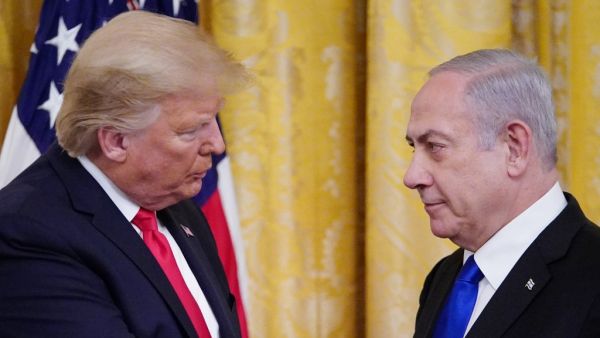US President Donald Trump’s much-anticipated Middle East peace plan was short on surprises but not on US and Israeli claims of “historic” achievement.
The initiative announced January 28 would extend Israel’s control over Jerusalem and allow it to annex a good part of West Bank settlements, including the Jordan Valley. The Palestinians, who were not involved in putting the plan together, were offered the conditional promise of demilitarised statehood, a 4-year “freeze” on settlements and $50 billion in economic incentives.
Rather than an opening towards negotiations, the proposal is a package left at the door of the Palestinians with the option, US diplomats said, to accept or offer an alternative to it.
In recent years, US positions have been clearly favourable to Israel, including the recognition of the Jewish state’s sovereignty over Jerusalem and the Golan Heights.
The absence of the Palestinians was glaring both in the preparation of the plan as in regard to the theatrics of its announcement. As they head to the United Nations to protest, the Palestinians find themselves stranded between two elections and the changed realities of the region.
Observers saw the White House announcement as less pertinent to Middle East peacemaking than to forthcoming elections in the United States and Israel.
Israel has its third election in less than a year next month. Prime Minister Binyamin Netanyahu’s Likud party has a narrow lead in polls over the centrist Blue and White alliance of Benny Gantz.
The deal was expected to help Trump court the Evangelical Christian right, an important part of his political base.
“Trump needs them, their money, their presence at his rallies and their continued support in the elections,” said Israeli columnist Nahum Barnea.
Trump’s pro-Israel stances have momentum in the US Republican establishment. A recent Gallup Poll indicated that Republican respondents had shifted to a more pro-Israel stance in the past ten years. In 1988, Gallup said 47% of Republican and 42% of Democratic respondents sided with the Israelis in the conflict with the Palestinians. In March 2019, 43% of Democrats stated pro-Israel positions while 76% of Republican asked said they sided with Israel.
The Democratic Party has increasingly shifted to progressive positions. Many of the reactions by Democratic presidential nomination contenders were critical of the Trump plan.
US Jews are divided on Trump. It was not surprising that Palestinian President Mahmoud Abbas cited criticism of the deal by J street, a liberal Jewish organisation that is not part of Trump’s constituencies.
Both US and Israeli leaders also have legal trouble in common. Trump is facing an impeachment trial in the US Senate and Netanyahu is defending himself against corruption charges. As he withdrew his request of immunity, Netanyahu was hoping his association with Trump could help him change the narrative at home.
Interestingly, Arab-Israelis (pre-1948 Palestinians) could weigh in against Netanyahu’s fortunes. Ayman Odeh, leader of the Joint List of Arab parties in the Israeli parliament, said “the path to trial is paved and no diplomatic public relations stunt in the world” would prevent Netanyahu from being brought to justice.
Americans and Israelis seem wary of the risk that electoral one-upmanship in Israel could make things worse for the Palestinians, with extremists in Israel pushing for immediate annexation of settlements and the United States reluctant to get involved.
Washington would like to avoid a showdown before Israel’s March 2 election. White House senior adviser Jared Kushner expressed “the hope” that Israelis “wait until after the election and we’ll work with them to try to come up with something.”
Israel’s Channel 12 reported that Israeli Finance Minister Moshe Kahlon told Palestinian Authority Civil Affairs Minister Hussein al-Sheikh the Palestinians should “temper their response until after the March elections in Israel” because “everything could change after the vote.”
This article has been adapted from its original source.








